| Article ID | Journal | Published Year | Pages | File Type |
|---|---|---|---|---|
| 3980926 | Cancer Treatment Reviews | 2007 | 6 Pages |
SummaryPathogenesis of myelodysplastic syndromes (MDS) involves epigenetic in addition to genetic aberrations. Gene silencing by epigenetic mechanisms is mainly mediated through variable states of DNA methylation in CpG islands within gene promoter regions in collaboration with post-translational covalent histone modifications, leading to consecutive chromatin remodelling. In patients with MDS, an increasing variety of epigenetically inactivated genes involved in cell growth, cell cycle control, differentiation, DNA repair, and cell death is known. Therefore therapeutic reversal of epigenetic silencing displays an effective treatment strategy for those patients. The use of nucleosidic DNA methyltransferase inhibitors (DNMT) 5-aza-2′ deoxycytidine (decitabine) and 5-azacytidine in different low-dose schedules has been shown to have significant activity in the treatment of MDS. Several studies demonstrated haematologic responses including CRs and PRs in up to 50% of patients, making these compounds promising treatment options especially for older patients not eligible for standard induction therapy. Recently, both drugs have been approved by the FDA for MDS treatment. In phase I/II studies using histone deacetylase (HDAC) inhibitors like sodium phenylbutyrate and valproic acid, alone or in combination with DNMTs, activity in MDS patients could also be demonstrated. In conclusion, low-dose schedules of epigenetically active drugs like DNMT and HDAC inhibitors display promising treatment options particularly for elderly MDS patients, also because of a favourable non-haematologic toxicity profile.
